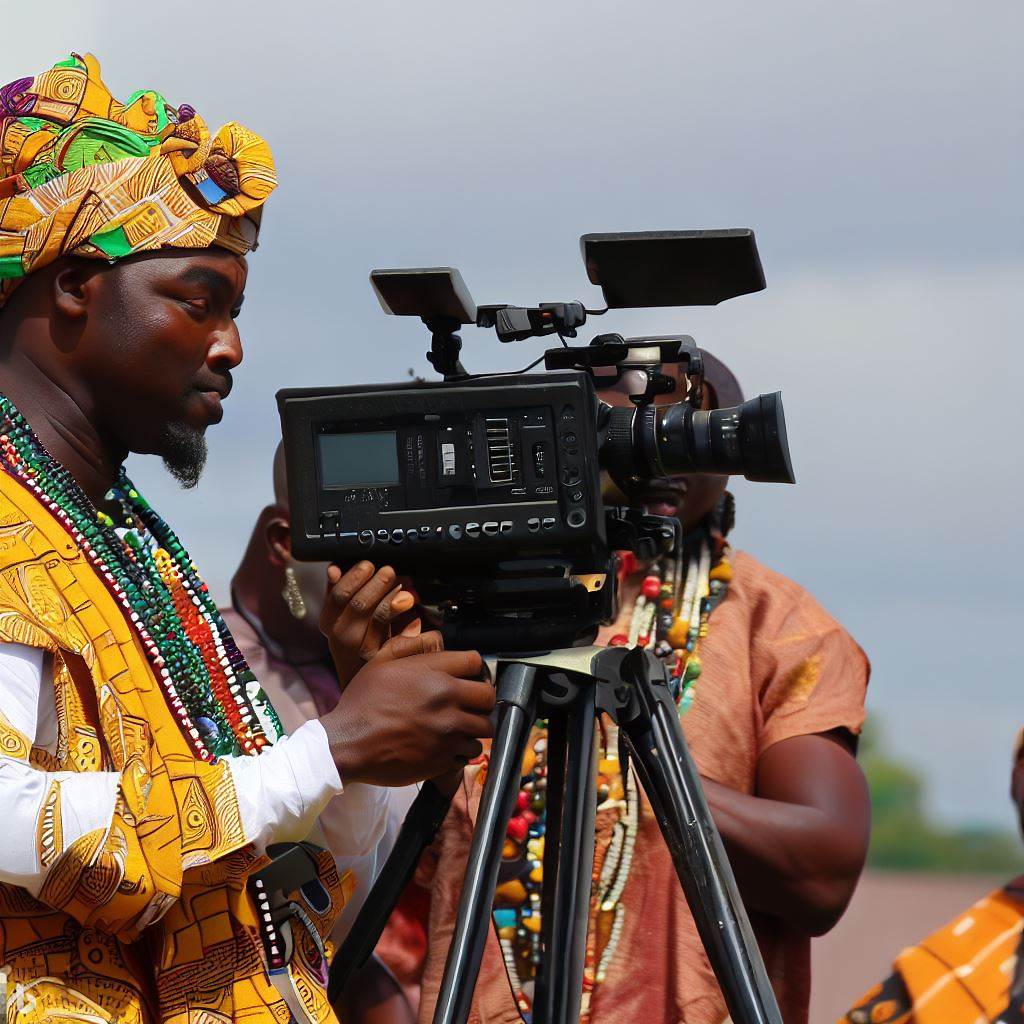Introduction
In this blog post, we will explore the intersection of culture and TV production in Nigeria. Understanding this connection is crucial because it reflects the unique identity of the country.
By examining how Nigerian culture influences TV production, we gain insights into the dynamic and diverse aspects of Nigerian society.
Nigeria, with its rich cultural heritage, has a thriving television industry that incorporates traditional values, languages, and customs into its programs.
This exploration helps us appreciate the significance of Nigerian television as a medium for cultural preservation and expression.
Additionally, it sheds light on the ways in which TV production in Nigeria has evolved to engage and resonate with a global audience.
By embracing their cultural roots while embracing modern storytelling techniques, Nigerian TV producers have successfully carved out a niche in the international market.
This blog post will delve into the specific examples of TV shows and films that exemplify the fusion of Nigerian culture and TV production, illustrating the significance of this intersection in shaping narratives and fostering national pride.
Ultimately, the exploration of the connection between culture and TV production in Nigeria enhances our understanding of the country’s cultural fabric, influences the representation of Nigerian society, and contributes to a more inclusive global media landscape.
Overview of Nigerian TV Production
When discussing the intersection of culture and TV production in Nigeria, it is important to provide an overview of the Nigerian television industry.
This will include a historical background of the industry, the growth and development of TV production in Nigeria, and the influence of Nigerian TV shows both domestically and internationally.
Historical Background of the Nigerian Television Industry
- Nigeria’s television industry has a rich history that dates back to the establishment of the Nigerian Broadcasting Corporation in 1959.
- Initially, the Nigerian television industry was heavily influenced by the British colonial government and focused on educational and informational programming.
- However, with the country gaining independence in 1960, the television industry started to shift towards reflecting Nigerian culture and society.
- A major milestone in the industry was the launch of the Nigerian Television Authority (NTA) in 1977, which became the primary broadcaster in the country.
Growth and Development of TV Production in Nigeria
- In the 1980s, there was a significant increase in TV production in Nigeria, with the emergence of privately-owned television stations.
- These stations played a crucial role in the growth of the industry, as they provided opportunities for local content production.
- Nollywood, the Nigerian film industry, also played a significant role in the growth of TV production by producing movies that were later adapted into TV series.
- Furthermore, the introduction of satellite television in the 1990s provided Nigerian audiences with access to international TV shows, which influenced the local production style and content.
Influence of Nigerian TV Shows both Domestically and Internationally
- Nigerian TV shows have had a tremendous impact on the country’s culture and society, both domestically and internationally.
- Locally, TV shows have become a powerful medium for promoting Nigerian culture, values, and traditions.
- Shows like “Super Story,” “Tinsel,” and “The Johnsons” have gained wide popularity and have become household names in Nigeria.
- Internationally, Nigerian TV shows have gained recognition and have been exported to various parts of Africa and beyond.
- “Battleground,” a popular Nigerian TV series, has been aired in multiple African countries and has become a global phenomenon.
- The success of Nigerian TV shows internationally has contributed to the growth and recognition of the Nigerian TV production industry.
In short, the Nigerian television industry has evolved significantly over the years, from its historical background to its growth and development.
Nigerian TV shows, with their influence both domestically and internationally, have become a powerful medium for showcasing Nigerian culture and promoting the country’s TV production industry.
With the continuous growth and success of Nigerian TV shows, the future looks bright for the intersection of culture and TV production in Nigeria.
Cultural Significance in Nigerian TV Production
In Nigerian TV production, there is a strong emphasis on representing different Nigerian ethnic groups and cultures.
The portrayal of societal norms, traditions, and values plays a crucial role in shaping the narratives of TV shows.
By showcasing these elements, Nigerian TV production promotes cultural diversity and helps in preserving cultural identity.
Representation of different Nigerian ethnic groups and cultures:
- Nigerian TV shows often feature characters from various ethnic groups, such as Yoruba, Igbo, Hausa, and more.
- These characters display the unique customs, languages, and traditions associated with their respective ethnic backgrounds.
- By representing the diversity within Nigerian society, TV shows create a sense of inclusiveness and cultural pride.
Portrayal of societal norms, traditions, and values:
- TV shows reflect the social fabric of Nigeria by portraying the accepted behaviors and norms of the society.
- They examine different aspects of Nigerian life, such as family dynamics, gender roles, and interpersonal relationships.
- Through these portrayals, TV production serves as a platform for societal reflection and discussion.
Promoting cultural diversity and identity through TV shows:
- Nigerian TV production actively promotes cultural diversity by showcasing the richness of the country’s different cultures.
- Characters are often depicted wearing traditional attire, participating in cultural festivals, and engaging in traditional activities.
- This representation fosters pride in one’s cultural heritage and encourages viewers to appreciate and respect other cultures.
- Moreover, TV shows help in preserving traditional knowledge and practices by featuring them in their narratives.
In fact, the cultural significance in Nigerian TV production is evident through the representation of different ethnic groups, the portrayal of societal norms, and the promotion of cultural diversity and identity.
TV shows serve as a medium for educating and entertaining audiences while fostering cultural pride and understanding.
Influence of Culture on TV Production in Nigeria
When it comes to TV production in Nigeria, it is impossible to separate it from the rich cultural heritage of the country.
Nigerian culture has a significant influence on the storytelling, scriptwriting, and overall production of television shows.
This section explores the various ways Nigerian culture impacts TV production in the country.
Impact of Nigerian culture on storytelling and scriptwriting
Nigerian culture, with its diverse ethnic groups and traditions, provides a treasure trove of stories for TV production.
The cultural values, beliefs, and experiences offer a unique perspective that is depicted in the storytelling and scriptwriting of TV shows.
These stories reflect the daily lives, struggles, and triumphs of Nigerians.
The Nigerian culture emphasizes the importance of community, family, and spirituality.
These themes often find their way into TV shows, creating a strong connection with the audience.
The values of respect, loyalty, and perseverance are also commonly portrayed, forming the foundation of many storylines.
Presence of traditional elements in TV shows
Television shows in Nigeria often incorporate traditional elements to capture the essence of the country’s diverse cultures.
Traditional attires, ceremonies, and rituals are frequently showcased, adding authenticity and uniqueness to the production.
These elements not only entertain but also educate viewers about the cultural heritage of the nation.
Furthermore, Nigerian TV shows often pay homage to traditional folklore and legends.
Characters inspired by mythical creatures or historical figures make their way into the storylines, creating a blend of reality and imagination.
This infusion of traditional elements serves as a source of pride and identity for Nigerians.
Incorporation of local languages, fashion, music, and other cultural elements
TV shows in Nigeria make sure to incorporate local languages, fashion, music, and other cultural elements to resonate with the audience.
By using local languages such as Yoruba, Hausa, or Igbo, the shows immerse viewers in the authentic Nigerian experience.
Fashion plays a significant role in showcasing Nigerian culture.
Traditional outfits like the agbada and gele are frequently featured, highlighting the beauty and diversity of Nigerian fashion.
Additionally, popular Nigerian music genres like Afrobeat or Highlife serve as the soundtrack, adding rhythm and energy to the TV shows.
Other cultural elements like food, dance, and customs are also seamlessly integrated into the TV production.
Viewers get a glimpse into Nigerian cuisine, traditional dances, and social practices, allowing them to experience the richness of the culture firsthand.
In general, Nigerian culture has a profound influence on TV production in the country.
From storytelling and scriptwriting to the inclusion of traditional elements and cultural nuances, Nigerian TV shows capture the essence of the nation.
This intersection of culture and TV production creates a powerful medium that not only entertains but also educates and preserves Nigeria’s heritage.
Read: Demystifying the Role of a Television Producer in Nigeria

Television as a Cultural Mirror in Nigeria
Television profoundly mirrors societal culture, a fact evident in Nigeria. Nigerian TV programs act as a cultural looking glass, addressing current concerns and offering insightful commentary across genres like drama, comedy, and reality TV.
This medium splendidly showcases Nigeria’s cultural intricacies and daily existence.
TV plays a pivotal role in reflecting contemporary issues, including corruption, politics, religion, and social hurdles.
By fostering open dialogue, these programs deepen viewer understanding.
Additionally, Nigerian television captures cultural subtleties and daily life, spotlighting traditions, languages, and diversity.
Whether set in rural communities or bustling cities like Lagos, shows celebrate heritage.
Moreover, TV shapes and challenges cultural norms. By presenting diverse viewpoints and defying conventions, it impacts societal attitudes.
“Jenifa’s Diary” questions gender stereotypes, empowering women, while “Big Brother Naija” champions inclusivity.
In summation, TV serves as Nigeria’s cultural reflection, spotlighting issues, cultural nuances, and norm evolution.
This dynamic medium fortifies open conversation, cultural pride, and norm exploration. Through varied genres, Nigerian TV molds and mirrors its vibrant culture.
Read: How to Succeed as a Television Producer in Nigeria
Challenges and Opportunities in the Intersection
In the intersection of culture and TV production in Nigeria, several challenges and opportunities arise.
Let’s explore them in detail:
Challenges
- Financial constraints and limited resources often hinder the growth of TV production in Nigeria.
- Balancing commercial success and cultural authenticity can be a significant challenge for producers.
Financial constraints and limited resources in TV production
One of the major hurdles faced by TV production in Nigeria is the lack of adequate financial support. Producing high-quality TV shows requires substantial financial investment.
However, due to budget constraints and limited resources, production houses struggle to meet these requirements.
Insufficient funding leads to compromised production values and limited access to advanced technologies.
Balancing commercial success and cultural authenticity:
TV producers in Nigeria face the challenge of creating content that appeals to a wide audience while staying true to the country’s cultural heritage.
Commercial success often depends on producing content that caters to popular tastes and trends, which may not necessarily reflect the cultural nuances of Nigeria.
Striking a balance between commercial viability and cultural authenticity requires careful planning and creativity.
Opportunities
- Strategies for leveraging culture to enhance TV production quality can create unique opportunities.
Strategies for leveraging culture to enhance TV production quality
Despite the challenges, the intersection of culture and TV production in Nigeria presents several opportunities.
1. Focus on diverse cultural narratives
Nigeria is a culturally rich country with various ethnic groups and traditions. TV producers can tap into this diversity by exploring and showcasing different cultural narratives.
By representing a wide range of cultures, they can engage diverse audiences and promote inclusivity.
2. Incorporate local languages
Nigerian TV production can gain authenticity by incorporating local languages. The use of indigenous languages resonates with viewers and adds a unique flavor to the content.
It also provides a platform for preserving and promoting Nigerian languages, which are an integral part of the country’s cultural heritage.
3. Showcase local talent
Nigeria boasts a vibrant entertainment industry with talented actors, writers, and directors.
TV production can leverage these talents by providing opportunities for local artists to showcase their skills.
By nurturing homegrown talent, the industry can create a distinct identity and establish Nigeria as a creative hub.
4. Collaborate with cultural institutions
Partnering with cultural institutions, such as museums and historical societies, can add depth and authenticity to TV production.
These collaborations can facilitate access to artifacts, historical knowledge, and expert guidance, enriching the storytelling process and fostering cultural preservation.
5. Engage with the audience
TV production in Nigeria can benefit from actively engaging with the audience.
This can be done through social media platforms and online forums, where viewers can provide feedback, share their thoughts, and contribute to the creative process.
Building a strong connection with the audience enhances the likelihood of creating content that resonates with the cultural sensibilities of the Nigerian audience.
In essence, the intersection of culture and TV production in Nigeria faces challenges such as financial constraints and the need to balance commercial success with cultural authenticity.
However, by leveraging cultural elements and adopting strategic approaches, these challenges can be turned into opportunities for growth and creativity.
TV production in Nigeria has the potential to flourish and leave a lasting impact on both local and global audiences.
Read: Behind the Scenes: A Day in the Life of a Nigerian TV Producer
Positive Outcomes of the Intersection
1. Increased pride, appreciation, and preservation of Nigerian culture.
Nigerian TV shows have played a significant role in promoting and preserving the country’s rich cultural heritage.
By showcasing traditional customs, languages, and lifestyles, these shows have instilled a sense of pride and appreciation among Nigerians, both at home and abroad.
2. Boosting the local entertainment industry and economy.
The intersection of culture and TV production has greatly contributed to the growth of Nigeria’s entertainment industry.
Through the creation of high-quality TV shows that highlight Nigerian stories and talent, the industry has attracted investments, created job opportunities, and boosted the country’s economy.
3. Global recognition and audience engagement with Nigerian TV shows.
Nigerian TV shows have gained international acclaim and have successfully captured the attention of viewers around the world.
Publish Your Professional Profile, Business or Brand
Showcase your expertise, gain trust, and boost visibility instantly on Professions.ng.
Publish NowThese shows have cultivated a dedicated fan base globally, leading to increased recognition and support for Nigerian content creators, actors, and producers.
4. Promotion of cultural exchange and understanding.
Through the intersection of culture and TV production, Nigerian TV shows have become a powerful tool for cultural exchange and understanding.
They bridge the gap between different cultures by showcasing Nigeria’s diverse heritage and facilitating dialogue about shared values, beliefs, and experiences.
5. Empowerment and representation of marginalized communities.
Nigerian TV shows have been instrumental in challenging societal norms and giving a voice to marginalized communities.
By featuring diverse characters and addressing important social issues, these shows promote inclusivity, empowerment, and representation for all Nigerians.
6. Inspiration for aspiring content creators and storytellers.
The success of Nigerian TV shows has inspired a new generation of content creators and storytellers.
Nigerian youth are now more inclined to pursue careers in the entertainment industry, fostering creativity, innovation, and the continuous growth of Nigeria’s media landscape.
7. Cultivation of soft power and national identity.
TV production that intertwines with culture has helped Nigeria to cultivate soft power on the global stage.
By influencing perceptions, shaping narratives, and promoting the country’s values and aspirations, Nigerian TV shows contribute to the development of a strong national identity.
8. Strengthening cultural tourism and cultural diplomacy.
The intersection of culture and TV production has also had positive implications for cultural tourism and diplomacy.
By showcasing Nigeria’s cultural wealth, these shows attract tourists, foster cultural exchanges, and enhance the country’s reputation as a diverse and vibrant nation.
9. Creation of opportunities for collaboration and partnerships.
The success of Nigerian TV shows has opened doors for collaboration and partnerships between local and international production companies.
This exchange of expertise, resources, and ideas strengthens the TV production landscape in Nigeria and expands the reach of Nigerian content on a global scale.
10. Nurturing national unity and social cohesion.
Lastly, the intersection of culture and TV production promotes national unity and social cohesion in Nigeria.
By celebrating the country’s cultural diversity, these shows foster a sense of unity among different ethnic groups and contribute to the country’s overall harmony and development.
In the end, the intersection of culture and TV production in Nigeria has yielded numerous positive outcomes.
From preserving and promoting Nigerian culture to fostering economic growth and global recognition, Nigerian TV shows have had a transformative impact on both the local and international stage.
Read: The Role of TV Producers in Nigeria’s Entertainment Growth
See Related Content: Understanding the Skills Gap in Nigeria’s Telecommunications Sector
Future Prospects and Recommendations
Potential growth of Nigerian TV production at the intersection of culture
- Nigeria has a rich cultural heritage that can be effectively showcased through television production.
- The growing global interest in diverse cultures presents a great opportunity for Nigerian TV productions to gain international recognition.
- Investments in infrastructure and technology can help improve the quality of Nigerian TV productions and attract a wider audience.
Encouraging collaborations and partnerships to enhance cultural representation
- Collaborations between Nigerian TV production companies and international networks can expand the reach of Nigerian content.
- Partnerships with cultural organizations and institutions can provide valuable resources and expertise in showcasing Nigerian culture.
- Co-productions with foreign TV production companies can facilitate the exchange of knowledge and ideas, leading to more authentic cultural representations.
Education and training to support aspiring TV producers in Nigeria
- Establishment of specialized TV production training programs can help aspiring producers acquire the necessary skills and knowledge.
- Scholarship programs and mentorship initiatives can support talented individuals who may not have the financial means to pursue a career in TV production.
- Collaborations with universities and media institutions can provide practical training opportunities for students interested in TV production.
All in all, the future prospects for Nigerian TV production at the intersection of culture are promising.
With the right investments, collaborations, and support, Nigerian TV productions have the potential to not only showcase the rich cultural heritage of Nigeria but also contribute to the global television landscape.
Encouraging partnerships and collaborations, as well as providing education and training, will play a vital role in enhancing cultural representation and fostering the growth of talented TV producers in Nigeria.
By capitalizing on these opportunities, Nigeria can establish itself as a key player in the global TV production industry.
Conclusion
In this blog post, we have explored the intersection of culture and TV production in Nigeria.
We discussed how Nigerian TV shows portray the rich cultural heritage of the country.
We also highlighted the importance of representation and diversity in TV production to showcase the various cultures within Nigeria.
Furthermore, we examined how TV shows have become a platform for social and political commentary.
The impact of Nigerian TV shows on the international stage was also discussed, as they have gained popularity globally.
Finally, it is crucial to continue exploring the intersection of culture and TV production in Nigeria.
By doing so, we can celebrate and preserve the diverse cultural identities within the country.
Additionally, this exploration allows for the promotion of cultural exchange and understanding on a global scale.
Therefore, it is vital to support and invest in the production of TV shows that accurately represent Nigerian culture.




